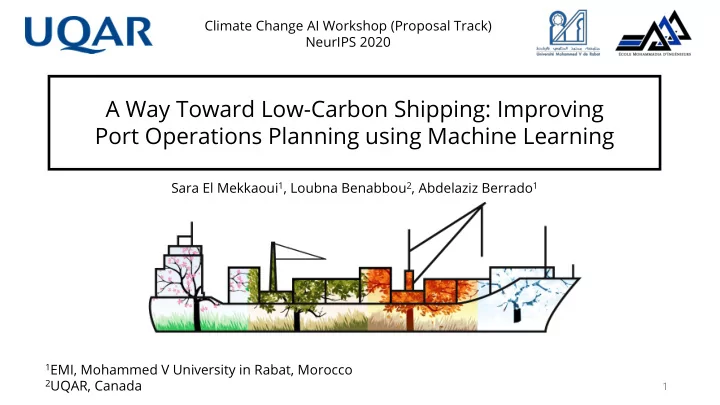

Climate Change AI Workshop (Proposal Track) NeurIPS 2020 A Way Toward Low-Carbon Shipping: Improving Port Operations Planning using Machine Learning Sara El Mekkaoui 1 , Loubna Benabbou 2 , Abdelaziz Berrado 1 1 EMI, Mohammed V University in Rabat, Morocco 2 UQAR, Canada 1
Shipping & Climate Change Emissions by Mode of Transport (g CO₂/ ton-km) Over 80% of global trade by volume is 80% carried by sea Shipping is the least emissions-intensive mode of transport Source: report "Decarbonising Shipping: All Hands on Deck" A Way Toward Low-Carbon Shipping: Improving Port Operations Planning using Machine Learning 2 Sara El Mekkaoui, Loubna Benabbou, Abdelaziz Berrado NeurIPS – CCAI 2020
Shipping & Climate Change Global shipping was responsible for 2.89% of global carbon dioxide (CO 2 ) emissions in 2018 In 2018, global shipping CO 2 emissions were 1 056 million tons which is equivalent to: 1.88 times 228,142,008 271 Canada’s annual CO 2 Greenhouse gas emissions from CO 2 emissions from 271 coal- emissions in 2018 228,142,008 fired power plants in one year passenger vehicles driven for one year Shipping data from the Fourth IMO Greenhouse Gas Study 2020: Reduction of GHG emissions from ships (MEPC 75/7/15). Equivalence data for vehicles and plants. Equivalence data for Canada's emissions. A Way Toward Low-Carbon Shipping: Improving Port Operations Planning using Machine Learning 3 Sara El Mekkaoui, Loubna Benabbou, Abdelaziz Berrado NeurIPS – CCAI 2020
Shipping & Climate Change Global share of NO X and SO X emissions NO X CO 2 15% 2.9% SO X 13% Shipping NOX and SOX global share from the "Third IMO Greenhouse Gas Study 2014: Safe, secure and efficient shipping on ocean." A Way Toward Low-Carbon Shipping: Improving Port Operations Planning using Machine Learning 4 Sara El Mekkaoui, Loubna Benabbou, Abdelaziz Berrado NeurIPS – CCAI 2020
Shipping & Climate Change Objective Measures Reducing total annual GHG emissions Technology Operation Market from shipping by at least 50% by 2050 compared with 2008. • Low-sulfur fuel oil • Voyage optimization • Economic incentives: • Alternative fuels • Energy management emissions levies, taxes or • Ship design (hull and • Fleet management trading systems superstructure, power and propulsion) A Way Toward Low-Carbon Shipping: Improving Port Operations Planning using Machine Learning 5 Sara El Mekkaoui, Loubna Benabbou, Abdelaziz Berrado NeurIPS – CCAI 2020
Shipping & Climate Change Principal options for improving energy efficiency Design Fl Fleet et ma manage gement ment, , Concep cept, , de desi sign gn sp speed d logi gist stic ics s and d ince cent ntive ives and d ca capa pabi bility Operation . 01 06 Ship Sh ip Ene nergy rgy Efficiency fficiency Design 02 05 Man anagement agement Hull l and d su supe perst struc ructur ure Voyage age opt ptimi miza zatio tion Pla lan . Operation SEEMP SE EMP 03 04 Design Power er and d pr propu pulsi sion on sy syst stems ms Ener ergy gy ma manage gement ment Operation A Way Toward Low-Carbon Shipping: Improving Port Operations Planning using Machine Learning 6 Sara El Mekkaoui, Loubna Benabbou, Abdelaziz Berrado NeurIPS – CCAI 2020
Shipping & Climate Change Voyage optimization / Just-in-time arrival Design Operation 01 06 Design 2- Voyage optimization 02 05 Operation Up to 10% savings in CO 2 emissions 03 04 • Optimal route selection Design • Just-in-time arrival Operation • Ballast optimization • Trim optimization A Way Toward Low-Carbon Shipping: Improving Port Operations Planning using Machine Learning 7 Sara El Mekkaoui, Loubna Benabbou, Abdelaziz Berrado NeurIPS – CCAI 2020
Shipping & Climate Change Just-in-time application in the port of Rotterdam or 188 000 tons of CO 2 emissions can be avoided every year by 35 % shortening the waiting time of bulkers by 12 hours. less fuel consumption compared to usual practice for a 23 % particular voyage. or 134 000 tons of CO 2 emissions can be avoided every year from 4 % containerships activity. Just in time trial yields positive results in cutting emissions. Just in time sailing saves hundreds of thousands of tonnes of CO2. A Way Toward Low-Carbon Shipping: Improving Port Operations Planning using Machine Learning 8 Sara El Mekkaoui, Loubna Benabbou, Abdelaziz Berrado NeurIPS – CCAI 2020
Challenges Just-in-time arrival Concept : based on the ship maintaining an optimal operating speed, to arrive at the port when the availability of berth and port Estimated Time of service is assured. Arrival (ETA) Advantages: Ships adjusting their speed and lowering their Berthing time gas emissions. Reducing waiting time at ports, which allow reducing emissions at coastal areas. More about just-in-time arrival. A Way Toward Low-Carbon Shipping: Improving Port Operations Planning using Machine Learning 9 Sara El Mekkaoui, Loubna Benabbou, Abdelaziz Berrado NeurIPS – CCAI 2020
Proposal Improving port operations planning and scheduling using Machine Learning Ships arrival time prediction Berth productivity estimation Emissions monitoring A Way Toward Low-Carbon Shipping: Improving Port Operations Planning using Machine Learning 10 Sara El Mekkaoui, Loubna Benabbou, Abdelaziz Berrado NeurIPS – CCAI 2020
Proposal Ships arrival time prediction Real-time Automatic Identification Network prediction of ships System (AIS) arrival times to port Weather Deep Learning Data Output Live map of ships positions. framework A Way Toward Low-Carbon Shipping: Improving Port Operations Planning using Machine Learning 11 Sara El Mekkaoui, Loubna Benabbou, Abdelaziz Berrado NeurIPS – CCAI 2020
Proposal Berth productivity estimation Model Forecasting berth Berth schedule productivity Operations records Machine Data Output Learning model Berth schedule from the seaports of Seattle and Tacoma. A Way Toward Low-Carbon Shipping: Improving Port Operations Planning using Machine Learning 12 Sara El Mekkaoui, Loubna Benabbou, Abdelaziz Berrado NeurIPS – CCAI 2020
Proposal Emissions monitoring Model Report of ship Ships activity data emissions Emissions factors Emission Data Output CO2 emissions map from Canada’s National Marine Emissions inventory tool Inventory Tool. A Way Toward Low-Carbon Shipping: Improving Port Operations Planning using Machine Learning 13 Sara El Mekkaoui, Loubna Benabbou, Abdelaziz Berrado NeurIPS – CCAI 2020
Contact Details Thank saraelmekkaoui@research.emi.ac.ma you loubna_benabbou@uqar.ca berrado@emi.ac.ma 14
Recommend
More recommend